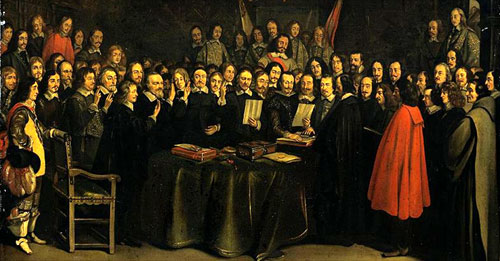|

 War
has been a problem that has plagued humanity
throughout the ages. History is filled
with accounts of disputes, conflicts and
bloody battles within and between nations,
some raging for thirty, fifty and even
100 years. Throughout history, nations
have often spent much of their resources
waging wars or arming themselves in preparation
for defense against other larger or more
powerful nations. Small heavily-armed
countries have become empires, conquering
other countries and overthrowing other
empires. One important concept that arose
to address the constant fear of having
to be vigilantly prepared for war, was
for the states in a region, or even globally,
to form alliances and agreements that
would provide 'collective security.' In
this arrangement, the states agree that
the security of each state is the concern
of all -- if any of the individual states
is threatened, they will all respond together
to defend the peace. Smaller alliances
were common throughout history, but in
1629, French Catholic Cardinal Richelieu
proposed a plan for collective security
on a much larger scale. His proposal was
partially realized in 1648 with the Peace
of Westphalia, a series of peace treaties
that ended several major ongoing wars,
including the Thirty Years' War in the
Holy Roman Empire and the Eighty Years'
War between the Dutch Republic and Spain.
It created an ongoing agreement for the
collective security of 140 different states
and dozens of other interest groups. War
has been a problem that has plagued humanity
throughout the ages. History is filled
with accounts of disputes, conflicts and
bloody battles within and between nations,
some raging for thirty, fifty and even
100 years. Throughout history, nations
have often spent much of their resources
waging wars or arming themselves in preparation
for defense against other larger or more
powerful nations. Small heavily-armed
countries have become empires, conquering
other countries and overthrowing other
empires. One important concept that arose
to address the constant fear of having
to be vigilantly prepared for war, was
for the states in a region, or even globally,
to form alliances and agreements that
would provide 'collective security.' In
this arrangement, the states agree that
the security of each state is the concern
of all -- if any of the individual states
is threatened, they will all respond together
to defend the peace. Smaller alliances
were common throughout history, but in
1629, French Catholic Cardinal Richelieu
proposed a plan for collective security
on a much larger scale. His proposal was
partially realized in 1648 with the Peace
of Westphalia, a series of peace treaties
that ended several major ongoing wars,
including the Thirty Years' War in the
Holy Roman Empire and the Eighty Years'
War between the Dutch Republic and Spain.
It created an ongoing agreement for the
collective security of 140 different states
and dozens of other interest groups. 
Although
the Peace of Westphalia did not succeed
in forever eliminating wars in Europe,
it significantly altered the pervading
paradigm, by affirming individual states'
rights to 'sovereignty' or independent
authority within their country, instead
of having to follow the mandates of an
empire that ruled over them. The regulations
set out in these treaties, created an
early model for the extensive international
treaties and international laws which
would follow.
|